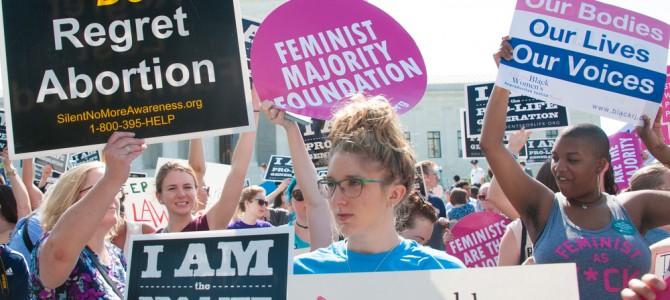
The so-called “Women’s March on Washington” seems by its title to take up the mantle for all womankind. But the organizers are spending a lot of time figuring out which women to exclude: they’ve singled out pro-life women in particular (along with other groups). The timing of the Women’s March—planned for the day after the inauguration—also makes the point that women who voted for President-elect Donald Trump are not part of the in-crowd.
With large groups uninvited, the Women’s March seems to represent a fairly narrow cross-section of American women. Its platform helps identify who is included: primarily those women who’ve bought into the two-pronged narrative that sex without commitment (either from men or to children) is a fundamental good, and that technologies enabling this freedom (unlimited access to contraception, sterilization, and abortion) are corollary human rights unquestionably contributing to women’s freedom and equality.
But do most women really believe that guaranteed, unrestricted sexual choice is an unmitigated good? The facts seem to tell a different story.
Let’s Ask the Women
The women’s vote in the 2016 presidential election, for example, was virtually split down the middle. A woman started, and another still organizes, the March for Life, scheduled this year for January 27. It’s the largest human rights demonstration anywhere on the planet, drawing hundreds of thousands from all 50 states in the middle of winter every single year. Also, primarily women staff and volunteer at crisis pregnancy centers and post-abortion counseling and recovery programs.
In other words, about half of all women share a concept of freedom vastly different from that of the impoverished alternative Women’s Marchers are championing. It should make “pussy hat” knitters question whether standing up for low-commitment sex really furthers the cause of women’s dignity.
The truth is that society-wide blessing on complete sexual license ultimately degrades women’s freedom and happiness. Contraception separates sex from its natural consequence (children), and therefore eliminates the need for marital commitment before sex to ensure the well-being of spouses and their offspring.
As a result, many women believe low-commitment sex is a price of entry into the dating marketplace. Risk-compensation effects mean that sex becomes more casual and frequent. We see this reflected in the numbers: over the long run, widespread contraception programs are not generally associated with steady declines in unintended pregnancy and abortion.
In addition, because women bear the burden of using contraception, the corresponding burden likewise shifts to women to “deal with” the consequences if and when it fails: through abortion or single motherhood, along with the practical and emotional consequences. This is to say nothing of the virtually undisputed evidence of the negative consequences to children facing fatherlessness.
Plenty of evidence also shows that most women do not actually believe that low-commitment sex is a good in itself. By-and-large, women hope that sex will lead to commitment. When it doesn’t, it hurts. In light of these facts, the Women’s Marchers are left to make the case that uncommitted sex, single motherhood, abortion, and broken hearts contribute to women’s flourishing. Wow.
Sexual License Means Capitulating to Oppression
Obviously, the past 50 years have seen many positive advances for women’s equality. In the loss category, however, is the prevailing attitude that women’s natural fertility is a disease to be managed and overcome rather than a gift to be respected and incorporated into our notions of relationship and freedom. And to what end? So women can adopt the stunted attitudes toward sex that male chauvinists always hoped they would? “If we can’t beat ‘em, join ‘em” indeed seems like a capitulation, not a victory, for the cause of women’s freedom.
There is a better way forward. The women who organize the March for Life, volunteer at crisis pregnancy centers, and champion marriage understand that true freedom is not the freedom to follow one’s whims. True freedom—the kind protected historically by the First Amendment and heralded popularly as a fundamental right until only a couple of years ago—is the freedom to do what one ought.
With regard to so-called “reproductive” or “sexual freedom,” therefore, women and men are truly free when they allow children and their needs, which include commitment between their parents, to shape attitudes about sex. A “women’s freedom” that demands people sacrifice these natural bonds can never be authentic.
The mainstream media seems unlikely to challenge the Women’s Marchers for purporting to speak for half the human race. But the fact is, about one in two women desire a richer, more humane notion of women’s dignity and freedom than the one the Women’s March has taken up.









